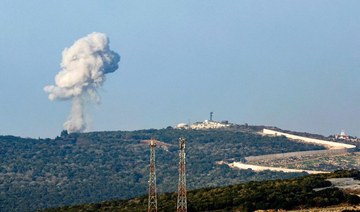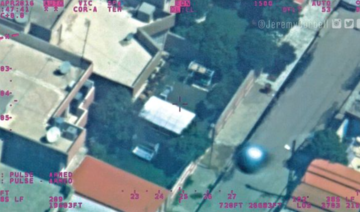BEIRUT: Israeli missile and artillery attacks rocked areas along Lebanon’s southern border and the heart of south Lebanon on Wednesday in what observers claimed was the heaviest series of raids in recent weeks.
Samer Wehde, a war correspondent located in southern Lebanon, told Arab News that “the ground shook beneath our feet.”
He said that the Israelis appeared to be using new types of missiles, and added that the “terrifying sounds” could be heard in Nabatieh, Al-Zahrani and Iqlim Al-Tuffah.
Israeli raids targeted the outskirts of Kfar Chouba, Kfarhamam, Salamiyah Farm and Halta in the eastern sector.
The towns of Yarin and Marwahin, the outskirts of Naqoura and Labweh mountain, as well as the areas surrounding Mays Al-Jabal and Hula, were also hit.
Meanwhile, Hezbollah said that it was targeting Israeli military sites, including Al-Abad and Ruwaizat Al-Alam.
The militant group said that five of its fighters were killed the past 48 hours, bringing the death toll to 113 since fighting began on Oct. 8.
A security source told Arab News that the Israeli army used drones over the border area to track targets and control the field from the air.
Israeli fighter jets carried out morning raids targeting forest areas between Ain Ebel and Bint Jbeil, along with the outskirts of Aita Al-Shaab, while Israeli artillery shelled Tal Al-Nhas and Talat Al-Awidah.
Israeli drones flew over the villages of Majdal Zoun and Chama.
In the second incident of its kind, the Israeli army targeted the funeral of a Hezbollah fighter taking place in the border town of Blida.
Three artillery shells, fired from the Israeli military site of Al-Bayad, struck the northern outskirts of the town, landing meters away from the funeral of Hassan Ibrahim. No injuries were reported.
The town of Aita Al-Shaab was targeted a few days ago during the funeral procession of a Hezbollah militant.
Israeli spy planes flew over the border town of Rab Al-Thalatheen as mourners gathered at the funeral of a Hezbollah member killed by a drone-fired missile on Tuesday.
A text message with instructions from Hezbollah to the people of the south, especially border towns, was shared on social media.
Residents were warned to comply with the “regulations” in order to protect the party’s fighters “so that none of us will take part in direct or indirect bloodshed.”
The Hezbollah message said: “Be discreet if you witness the movements of military or other fighters, as we are entrusted with their safety,” and warned residents against photographing missile launch sites.
Sirens sounded in the Upper Galilee early on Wednesday as four Israeli interceptor missiles exploded above Blida.
Israeli raids targeted the outskirts of Aita Al-Shaab and Ramiya, while Hezbollah targeted the Metula colony with two missiles.
The Israeli army bombed an area near residential homes in the town of Aitaroun, with two shells falling on the outskirts of Maroun Al-Ras.
Israel said on Wednesday that its warplanes bombed “Hezbollah targets in Lebanon, including infrastructure and military sites.”
Two missiles were launched from southern Lebanon toward the Israeli site of Metulla in the Upper Galilee, Israeli media said.
Hezbollah deputy Hassan Ezzedine said on Wednesday that the group is still fighting along a front from Naqoura to the Shebaa Farms.
“We are capable of deterring the enemy from its aggression, and we are mostly concerned about our homeland, Lebanon, its sovereignty, interest, and all the Lebanese,” he said.
The violent escalation on Wednesday forced many of those previously unwilling to leave their villages to head to safe areas, especially the city of Tyre.
More than 24,000 displaced people have registered with the Natural Disaster Management Department in the Union of Tyre Region Municipalities.
























